TAPESTRY – a stitch in (fifty years of) time
TAPESTRY – a stitch in (fifty years of) time
Norman Warwick thanks The Guardian
Where it once might have been The New Musical Express, Melody Maker or Rolling Stone that my friends recommended to each other for musical news and informed opinion, it seems the established broadsheet press have replaced such titles in our preferred lists. Even my once-rebellious, anti-authoritarian song-writing partner Colin Lever recently sent me a link not to some John Tobler rant or Charles Shar Murray dismissal but to a broadsheet Guardian article compiled collaboratively by Dave Simpson and Laura Snapes and published on Friday 12th February.
I am always interested to know what friends and fellow pocket-money musicians think of particular albums and artists, but it is rare that I hear what top-level established acts think of each other and / or each other´s work. I was delighted, then, to see that Simpson & Snapes (alliterative names work really well for collaborative work, don´t you think?) had gathered the opinions of many of Carole King´s contemporaries and, indeed, a number of those who have since been inspired by her canon.
James Taylor emerged pretty much as a contemporary of King´s, give or take the odd anachronisms in my non-chronological memories. Born in 1948, this American singer-songwriter and guitarist is now a five-time Grammy Award winner, inducted into the Rock and Roll Hall of Fame in 2000. He is one of the best-selling music artists of all time, having sold more than 100 million records worldwide.
Taylor achieved his breakthrough in 1970 with the No. 3 single Fire and Rain and had his first No. 1 hit in 1971 with his recording of You’ve Got a Friend, written by Carole King in the same year. His 1976 Greatest Hits album was certified Diamond and has sold 12 million US copies. Following his 1977 album JT, he has retained a large audience over the decades. Every album that he released from 1977 to 2007 sold over 1 million copies. He enjoyed a resurgence in chart performance during the late 1990s and 2000s, when he recorded some of his most-awarded work (including Hourglass, October Road, and Covers). He achieved his first number-one album in the US in 2015 with his recording Before This World.
He is known for his covers, such as How Sweet It Is (To Be Loved by You) and Handy Man, as well as originals such as Sweet Baby James and my late mother-in-law always claimed she had been scarred for life by entering a record shop to buy her son, Chris, a copy of Mud Slide Slim for his birthday. She had no idea what that phrase meant, or who had recorded it, and told my wife and I later that she had never felt so foolish in all her life.
When asked for his thoughts on the Tapestry album he recalled how ´the singer-songwriter genre was named around 1970, give or take, and was said to apply to me and, among others Joni Mitchell, Cat Stevens and Jackson Browne. Why that supposed movement didn’t begin with Bob Dylan or even Woody Guthrie or Robert Johnson beats me – maybe they were still ´folk”. But, if it means anything, Carole King deserves to be thought of as its epitome. I’d been deep into her songs – Up on the Roof, Natural Woman, Crying in the Rain – for a decade before Danny Kortchmar introduced us in Los Angeles in 1970. She played piano on my Sweet Baby James album while working on the songs for her own Tapestry. Our collaboration, our extended musical conversation over the next three or four years was really something wonderful. I’ve said it before, but Carole and I found we spoke the same language. Not just that we were both musicians but as if we shared a common ear, a parallel musical/emotional path. And we brought this out in one another, I believe.

It was a big change for Carole (seen left with James Taylor) to leave New York for LA. She left behind an established, hugely successful career as a Brill Building [era] tunesmith, with her husband and lyricist, Gerry Goffin, and went west, on her own, with two young daughters. She started writing by herself, about herself – that is to say, from her own life. It came out of her so strong, so fierce and fresh. So clearly in her own voice. And yet, so immediately accessible, so familiar: you knew these songs already. I had that experience the first time I heard Carole sing You’ve Got a Friend from the stage of the Troubadour: “Oh yeah, that one.” Incredible that this song didn’t always exist. Carole’s focus was her family: [children] Louise and Sherry, and imminently, Levi and Molly. She had no time for the stuff the rest of us in Laurel Canyon were up to. She had her family and her songs. Certainly she would have her adventures, dramatic emotional switchbacks, in years to come. But in those days, she seemed to watch the dancers with a kind, wry detachment. To me, she was a port in the storm, a good and serious person with an astonishing gift, and, of course, a friend.´
On seeing that the next contributor to this Guardian list was Roberta Flack I found it hard for a moment to place her music in context with either Carole King or James Taylor, but it is that very diversity that adds strength and balance to The Guardian article. Flack was, of course, a Soul singer known for soft ballads and her best known songs include The First Time Ever I Saw Your Face, an interpretation of a Ewan McCall song more than secure in this company, Where Is The Love (with Donny Hathaway), Feel Like Makin’ Love and Set The Night To Music with Maxi Priest, an artist we recently featured in Sidetracks & Detours.
´I first heard the Shirelles’ version of Carole King´s Will You Still Love Me Tomorrow,´Roberta recalled for detectives Simpson and Smapes, ´(long before Tapestry came out) when I was working as a school teacher in Washington DC. The song stuck with me and I included it in my repertoire at the time when I was playing in a pub called Mr Henry’s on Capitol Hill and later recorded it for my album Quiet Fire. It was for me a time of deep introspection and this song expressed a vulnerability that each of us experiences in the course of finding and embracing love. Donny [Hathaway] and I loved the songs on Tapestry and worked out our arrangement of You’ve Got a Friend in a way that expressed how we felt about what it means to help each other through the best and the worst of times. My friend and fellow Aquarian Carole King has shaped our musical landscape with the songs that she wrote; songs that touch each of us in such deeply personal ways.´
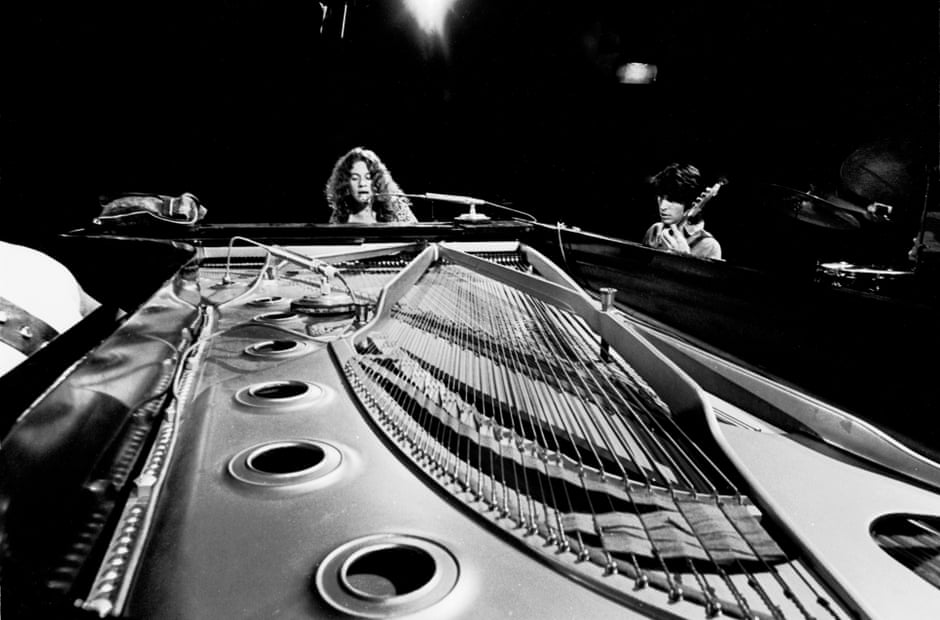
Toris Amos first heard Tapestry In 1971, at seven years old, and her mind was blown. A ´cool teenage babysitter´ put the new album Tapestry on her family stereo, and, she told The Guardian reporters, ´it was almost as if Mother Earth herself was singing to us. There was a clarity to the storytelling, whether the songs had us dancing with them or haunting us as we sat cross-legged on the worn Methodist rug. And after we had laughed and cried during the playing of the album, we were both very sure that in Carole King we had both found a new friend for life.
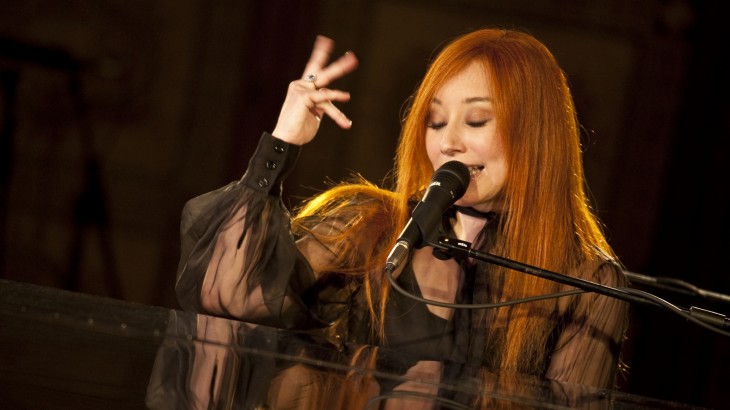
They don’t make records like Carole King’s Tapestry any more. They can’t, because I don’t think the people who might attempt to do so have ever totally reckoned with the kind of magic she was working on that album. Consequently, the types of records that Tapestry made it possible to make and sell in large numbers, those records that are vulnerable, confessional, sung and played by the person who wrote the songs and ´classic´ in sound and sentiment, often feel emotionally supercharged, where Tapestry feels plain-spoken and easy.
As someone who makes music that shares at least some kind of DNA with King’s iconic album, I can attest that making a record as compelling as Tapestry requires the mastery of a language that Carole King invented. It’s sort of a musical Rosetta stone, and a huge testament to what an incredible interpreter of the human experience she was, and continues to be.´
Although I have always enjoyed hearing her singles on the radio, I am not especially aware at all of her full body of work. I knew, through her occasional forays into the charts, however, that Rickie Lee Jones was a wonderful story-teller.
Rickie Lee Jones is an American vocalist, musician, songwriter, producer, actress and narrator born in 1954. Over the course of a career that now spans five decades, Jones has recorded in various musical styles including rock, R&B, blues, pop, soul, and jazz. Jones is a two-time Grammy Award winner Additionally, she was listed at number 30 on VH1‘s 100 Greatest Women in Rock & Roll in 1999. Her album Pirates was number 49 on NPR‘s list of the 150 Greatest Albums Made by Women.
She first heard of Carole King around the age of 16.she remembered for The Guardian and added that James Taylor brought King to the attention of the wider world when he asked her to open for him in 1971.
´But the truth is,´ she stressed, ´I had been listening to her most of my life, through the voices of the many women and men who recorded her music.
Up on the Roof, recorded by the Drifters, never grew old on my record player. I didn’t have to live in the city to understand how much it meant to have a place to call your own, to feel how hard life is after working all day and looking up at the stars and finding a smile in your heart. Carole and Gerry delivered a Valentine that day, one the whole world opened year after year. The sum of the song was greater than the words themselves: “Hustling crowd”, “tired and beat”, “right smack dab” – phrases that could become dated, but never did because the sentiment was so kind. Somewhere in there are the seeds that blow all the way to New Jersey, and plant themselves into young Bruce Springsteen who, like me and Chuck E and Junior Lee, invited Wendy, Kitty, and all the others Up on the Roof. It was the safest place a kid standing in the shadow of city life could find, on top of the world listening to the stars.
Folk rock had long dominated the FM airwaves when music began to make a move back to the fundamentals of song-writing: the three-minute song, the chorus sung thrice, the bridge – an endangered passage from one end of the song to the other. I was happy to hear songs again coming from Cat Stevens, James Taylor and Carole King. She wrote from a genre she had been part of creating, the rock’n’roll of soul.
Tapestry was the most important record of its time. I won’t qualify it by saying female, songwriter or any of that. It signalled the country and the people’s desire to have a simple and beautiful song to sing. With Carole King, matters of personality and the adoration of the star are set aside. She is first a working woman. Her hit You’ve Got a Friend was written for Gerry Goffin, who had mental illness, to let him know that even though she may not be by his side, she was always on his side. I know nothing about the two of them except this: they wrote great songs, and the culture that I call mine is shaped in part by the music they wrote while Carole was still just a kid.
Tapestry’s success roots us to our musical history. It overcame whatever current trend would render it passé and continues to sell year after year. That woman on the cover of Tapestry evoked a calm and peaceful soul. I used to just sit and stare at it. She looked like an educated woman who took care of her life. Fifty years later, Tapestry remains undaunted and timeless as it is reflected in the voices of women who discover the songs as if they were just written last year. Easy enough to remember, haunting enough to want to remember, that is the mark of a great song – and great songwriter.´
There used to be a local player on my own folk circuit back in the later seventies and eighties called Jim Schofield. He was also a member of one the region´s best conmtemporary folk groups, too, but as a sole act and whenever hosting a club event, Jim Schofield would sing Rider In The Rain. For reasons even I didn´t understand that song immediately resonated with me, and enquiries to Jim received the information that it had been written by Randy Newman, and that song spoke to me in the everyday language several of these contributors to The Guardian piece identified in King´s work.
Newman is an American singer-songwriter, arranger and composer known for his Southern-affected singing style, early Americana-influenced songs, and various film scores. His best-known songs as a recording artist are Short People, I Love L.A., and You’ve Got a Friend in Me, while other artists have enjoyed more success with cover versions of his Mama Told Me Not to Come, I Think It’s Going to Rain Today and You Can Leave Your Hat On.
´I think you could make a pretty good case that Carole King and Gerry Goffin were the best popular songwriters of the last half of the 20th century´, he responded to his Guardian questioners, ´and I love Will You Still Love Me Tomorrow. Everything she sings is deeply felt.´

Sharon Van Etten is less well known to me although she has recorded five studio albums, the latest of which is Remind Me Tomorrow (2019).
She recalls that Tapestry was one of the first records she and her mother I bonded over.
´It was so meaningful to sing in unison with my mom to a guttural, honest account performed by a stranger to whom I felt so inexplicably connected: a friend, a sister, a mother, and somebody’s daughter, a low voice and an attitude. From that point onward, I carried her music and spirit with me.
I reconnected with King’s music when I was in high school. I was about to audition for choir. I always leaned toward rock in the classical world. The three songs on my list to audition with were: You’ve Got to Hide Your Love Away by the Beatles and I Feel the Earth Move and Natural Woman by Carole King. I narrowed it down to the two Carole King songs and was given the choice of show choir or madrigals.
Carole’s songs made me want to sing her melodies and her harmonies and I felt closer to her while finding my path as a singer even at that young age. In my 30s, watching her musical on Broadway, I was overwhelmed with feelings of gratitude for her story. It showed the way in which a woman can pursue her own career, have a family and achieve happiness. That is a delicate balance that I strive for in my own life every day.´
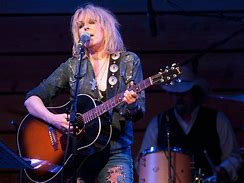
Lucinda Williams (left) is an American rock, folk and country music singer, songwriter and musician. She recorded her first albums in 1978 and 1980 in a traditional country and blues style and received very little attention from radio, the media, or the public. I loved one of her later albums, Car Wheels On A Gravel Road and can see why her own writing qualified her to discuss the merits of Carole King. Nevertheless, although I had been looking forward for eighteen months or so to seeing her on tour in the UK I actually walked out of a concert at Manchester Apollo, bemused by her lateness on stage and apparent lack of engagement with her audience. Nevertheless, a few years earlier, she had released her self-titled album, Lucinda Williams. This release featured Passionate Kisses, a song later recorded by Mary Chapin Carpenter, which garnered Williams her first Grammy Award for Best Country Song in 1994. And by the way I should say here that Mary Chapin Carpenter would also sit very comfortably in any company invited to talk about Carole King, as she is herself a wonderful song-writer.
Williams told The Guardian that ´I would have just turned 18 when Tapestry came out, when I was really being influenced by singers and songwriters. Carole King was an inspiration. She was a woman, and she wrote amazing songs – so you’d learn by listening to It’s Too Late or whatever, over and over. She set the stage for other singer-songwriters who came along after her, because there wasn’t a market yet and the industry didn’t know what to do with us.
None of us singer-songwriters were known for our voices, and we had to get past that. I had to get past the fact that I wasn’t going to sound like Linda Ronstadt or Joni Mitchell or Carole King, but from Carole I learned that you can accept your own voice and work within your limitations, which was liberating.´
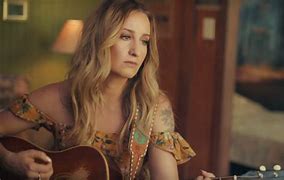
Margo Price is another American singer-writer we have included in Sidetracks & Detours in the past year or so, with a major feature still available free in our archives. Margo is a pretty forthright kind, and she left The Guardian inquisitors in no doubt of her feelings.
´Tapestry is exactly that: a sonic tapestry of some of the greatest song´-writing and a master-class in blending the roots of folk, soul, rock and blues while never feeling forced. My father told me about the album when I was about 18, and it shook me to the core. It became one of the blueprints that I measured smart pop music by. Many have tried to imitate Carole’s sound, and great artists like Aretha Franklin have interpreted her work because her songs are timeless, limitless and, in a way, defy genre. This album has been one of my constants during quarantine. Even in its saddest moments, Carole’s voice can lift my spirits and move mountains.
I have known the music of Natalie Merchant since her time as an American alternative rock singer-songwriter. She joined the folk rock band 10,000 Maniacs in 1981, and was lead vocalist and primary lyricist for the group. She remained with the group for their first seven albums and left it to begin her solo career in 1993. She has since released seven studio albums.
It comes as a shock to the system when I write that I have been listening to Natalie for just on forty years now.
It should be no surprise to me then that she herself says, before directly answering the Guardian enquiries, that:
´It is a shock to admit that I could have been cognisant of an event that occurred 50 years ago, but my summer of 1971 memories are quite vivid. I was just seven, but I could feel the seismic changes of the times: they were shaking the foundations of my home. The earth was moving under my feet and the sky was tumbling down. My parents’ marriage was in pieces – my mother had thrown it against the kitchen wall in an effort to shatter the mould of her post-war, Catholic-American girl-self. She got a job, she wasn’t home when we came back from school, she didn’t drag us to mass on Sundays any more, she stopped wearing a bra, and she stopped loving our father.
Her new friends were young single women. They drank red wine and communed deep into the night over the ecstasies and sorrows of their unattached, sexually liberated, self-actualised lives. They idolised Gloria Steinem, read Susan Sontag and dressed like Jane Fonda. And without exception, they all listened to the ladies of the canyon, that trinity of confessional singer-songwriters: Joni Mitchell, Carly Simon and Carole King.
´To say Tapestry was part of the soundtrack of my childhood would be a woeful understatement. It was a speckless mirror where we girls and women saw ourselves reflected: natural, beautiful, powerful, fragile, lonely, joyous, regretful and resolute. It was a handful of songs and simple contradictions that were all truths. It was a brimful cup of intoxicating freedom, and it was the souring aftertaste of all that headiness. It was realising the price of striking out alone was growing weary of the world and craving the same ties that had made us feel so bound-up.
A skilled craftswoman, Ms King wrought something durable with Tapestry that has not outworn its usefulness. Her 12 songs have been ringing clear and true for 50 years. We all understand when she mourns constancy and asks: ´Doesn’t anybody stay in one place any more?´ We know how people shift, how they change, how they go away, and oftentimes leave us longing. When ´something inside has died´, or we are ´down and troubled´ and turn to music for shelter and consolation, we will always find it in this album.´

Rufus Wainwright recalled for The Guardian that ´Tapestry was around our house when I was growing up,´ and surely the album wouid be have been in the record collection of any family that included Kate and Annie and Martha and Loudon.
´However, I connected with it more when I moved to California because it’s the blueprint for anybody who’s starting off in song-writing in LA. Carole King made this incredible transformation from Brill Building songwriter to performer, but she didn’t go crazy or self-destruct. She was able to remain a good parent and – especially now I’m a father – she has always been a role model for me.
Tapestry is a bundle of emotions, and she doesn’t sound like anybody else. She wasn’t necessarily the greatest singer, but she has a unique style and attack. She’s not pulling any punches: it’s a great lesson in how to be yourself and be successful. She’d worked with great songwriters and artists, and knew all the great recording engineers and session players, and was able to channel everything she’d learned in her own way. Tapestry is the ultimate in terms of doing what you want artistically and just surviving as a human being in the record business. She made this amazing milestone in music without having to sacrifice her soul to do it.´

Lucy Dacus, born 1995, is an American indie rock singer-songwriter from Richmond, Virginia. She has released two critically acclaimed albums: No Burden (2016) and Historian (2018). In 2018, she formed Boygenius with Phoebe Bridgers and Julien Baker.
´When I listened to Tapestry from my mom’s CD collection, I was young enough that it didn’t register as good or bad.´ she contributed to the celebration of Carole King.´It just defined what music sounded like to me, and it’s still a foundation of how I understand song-writing. She’s clever in the good way – queen of internal rhyme – and I love how her melodies reinforce the tone of the lyrics. She keeps it simple, but that’s what makes it universal.
I’ll be honest that the song of hers I’ve heard the most is Where You Lead as the Gilmore Girls theme – the version she sings with her daughter. How many hours have I spent sitting on the couch with my mom harmonising to that song? It’s a tradition we’ve carried on a few times during quarantine over the phone.
I also got to see the Broadway show about her, which was wonderful, and really made me realise how special and rare it is to write one song that will carry on a life that is bigger and longer than any human could hope for. And Carole King wrote tons of them! I’ll never forget watching her tribute at the Kennedy Center in 2015 on TV, when Aretha Franklin sang Natural Woman and she stood up from her seat of honour and sang along, arms in the air. I looked up the video to remind myself of it and had a good little ugly cry. I recommend it.´
These wonderful words above, from a collection of obviously admiring writers all worthy of the epithet ´great´ in their own right , offer a colourful portrait of Carole King.
It was Joan Armatrading, though, who with a little love and affection said it best, and briefest of all.
´One of the best albums, ever, by one of the best songwriters, ever. Period.´
Nevertheless as I jumped from Lanzarote, Spain on to this Guardian bandwagon I read their request for a small favour, well aware that I had only very barely adapted their article to share with readers of Sidetracks & Detours.
Through these turbulent and challenging times, after all, millions rely on the Guardian for independent journalism that stands for truth and integrity. Readers chose to support the broadsheet financially more than 1.5 million times in 2020, joining existing supporters in 180 countries.
Here in the early weeks of 2021, the newspaper commits to another year of ´high-impact reporting that can counter misinformation and offer an authoritative, trustworthy source of news for everyone.´
With no shareholders or billionaire owner, they set their own agenda and provide truth-seeking journalism that’s free from commercial and political influence. When it’s never mattered more, The Guardian can investigate and challenge without fear or favour.
Unlike many others, The Guardian claim they have maintained their choice: to keep Guardian journalism open for all readers, regardless of where they live or what they can afford to pay. They do this, they say, because they believe in information equality, where everyone deserves to read accurate news and thoughtful analysis. Greater numbers of people are staying well-informed on world events, and being inspired to take meaningful action.
In the last year alone, whilst offered readers a comprehensive, international perspective on critical events – from the Black Lives Matter protests, to the US presidential election, Brexit, and the on-going pandemic.
We at sidetracks & detours would claim to have done some of that too, without any of their staff resources, marketing reach and yet work just as hard to report to a tiny, tiny percentage of their readership. We are nevertheless delighted they are reporting from the same fields of music and the arts in which we, too have pitched out tents. We thank them for articles like this one, and I am confident they would agree that by adapting this piece we are able to deliver it a way that might be of interest to those of our readers not yet familiar with The Guardia, and so encourage them to add it add it to their reading lists,… whilst still remembering what sidetracks & detours has to offer, of course !

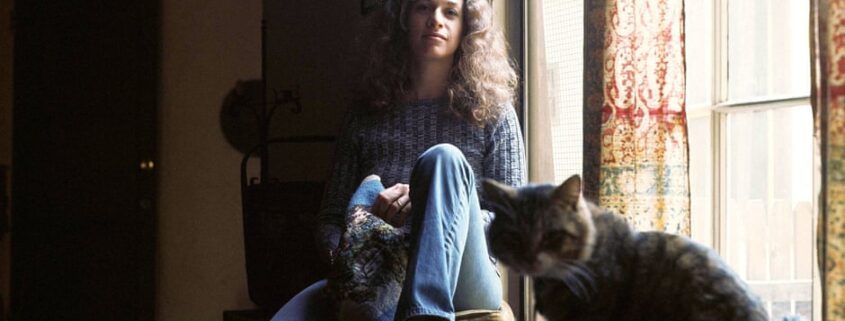


Leave a Reply
Want to join the discussion?Feel free to contribute!